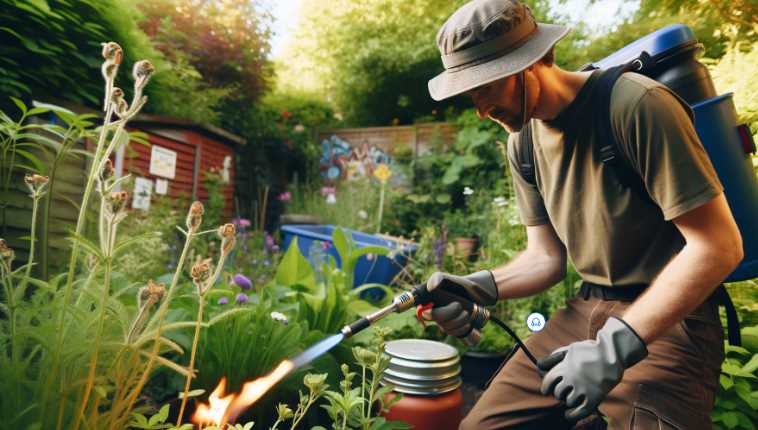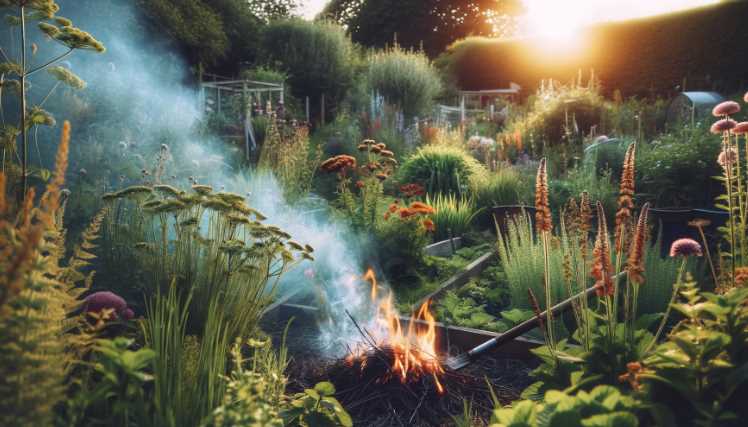No. Burning weeds in your garden is generally not recommended due to the associated risks and potential environmental harm.
Burning weeds in your garden can have several drawbacks:

- Air Quality: Burning releases pollutants into the air, contributing to air pollution. This can be harmful to you, your neighbors, and the environment.
- Soil Health: The intense heat from burning can damage the soil structure and kill beneficial microorganisms. This may negatively impact the overall health of your garden.
- Safety Concerns: Uncontrolled fires can pose a risk to your property, neighboring properties, and even wildlife. It’s essential to consider safety implications before using fire as a weed control method.
- Regulations: In many areas, burning weeds may be subject to local regulations or restrictions. It’s crucial to be aware of and adhere to any legal requirements regarding open burning.
| Aspect | Data/Statistic |
|---|---|
| Air Quality Impact | Increase in particulate matter |
| Soil Health Impact | Damage to soil microorganisms |
| Weed Seed Elimination | Incomplete weed seed destruction |
| Environmental Consequences | Release of pollutants into the air |

Purpose of Burning Weeds
Weed Control
Burning weeds serves as a method for effective weed control in gardens. The process involves the rapid elimination of unwanted vegetation, preventing these plants from competing with desired plants for essential resources like sunlight, water, and nutrients.
Nutrient Release
Additionally, the purpose extends to nutrient release. When weeds are burned, the organic matter undergoes combustion, breaking down into components that contribute essential nutrients back into the soil. This nutrient recycling can enhance the overall fertility of the soil, providing a potential benefit for the growth of other plants in the garden.
Speed and Efficiency
One of the key motivations for burning weeds lies in the speed and efficiency of the process. Compared to manual removal or other alternative methods, burning can be a quick solution, especially for large areas infested with weeds. However, it is imperative to weigh these advantages against the potential environmental and safety drawbacks, as discussed in the subsequent sections.
Advantages of Burning Weeds
Weed Control
| Pros | Cons |
|---|---|
| Quick weed elimination | Potential air pollution |
| Efficient resource use | Soil structure impact |
Burning weeds offers a rapid and efficient method for weed control, preventing unwanted plants from competing with desirable vegetation for resources. This quick elimination can save time and effort in garden maintenance. Moreover, it optimizes resource use by diverting nutrients from burned plants back into the soil.
Nutrient Release
| Pros | Cons |
|---|---|
| Return of nutrients to soil | Release of harmful substances in the air |
The process of burning weeds contributes to nutrient cycling in the garden. As plant material combusts, it releases nutrients back into the soil, fostering a nutrient-rich environment for other plants. However, the release of potentially harmful substances into the air during combustion is a significant drawback.
Environmental Concerns
| Pros | Cons |
|---|---|
| Quick disposal of weeds | Air quality degradation |
| Nutrient recycling | Soil health impact |
While burning weeds offers advantages such as quick disposal and nutrient recycling, it raises environmental concerns. The release of smoke can degrade air quality, and the practice may lead to long-term soil health issues, affecting the overall sustainability of the garden.
Legal and Safety Considerations
Local Regulations on Burning Weeds
Understanding and adhering to local regulations on burning weeds is crucial before embarking on such practices. Different regions may have specific rules and restrictions concerning open burning, often implemented to address environmental concerns and minimize safety risks.
Safety Precautions
Fire Safety
| Safety Measures for Burning Weeds |
|---|
| Clear the area of flammable materials |
| Have firefighting equipment on hand |
| Monitor weather conditions to prevent uncontrolled fires |
| Follow local guidelines and regulations for safe burning |
Respiratory Protection
| Protective Measures Against Respiratory Hazards |
|---|
| Wear masks designed to filter out particulate matter |
| Use respiratory protection to prevent inhalation of harmful gases |
| Ensure proper ventilation during the burning process |
It is imperative to prioritize safety by adopting these precautions to minimize the risk of accidental fires and protect against potential respiratory hazards associated with burning weeds.
Alternatives to Burning Weeds
Natural Weed Control Methods
Exploring alternatives to burning weeds is essential for those seeking eco-friendly and sustainable weed management practices. Natural methods such as manual removal, the use of natural herbicides, and promoting beneficial organisms can effectively control weed growth without resorting to combustion.
Mulching and Composting
Mulching and composting are viable alternatives that offer benefits without the environmental impact associated with burning.
Mulching
| Advantages of Mulching | Disadvantages of Mulching |
|---|---|
| Suppresses weed growth | Requires regular replenishment |
| Conserves soil moisture | Potential for weed growth in the mulch itself |
| Enhances soil fertility | Improper application may lead to pest problems |
Composting
| Benefits of Composting | Considerations for Effective Composting |
|---|---|
| Returns nutrients to the soil | Proper layering and aeration are essential for effective composting |
| Improves soil structure and water retention | Balancing green and brown materials is key |
| Supports a diverse microbial community in the soil | Monitor compost temperature for optimal decomposition |
Adopting these alternatives not only helps in weed control but also contributes positively to soil health, fostering a more sustainable approach to gardening without resorting to the potential hazards of burning weeds.
Conclusion
The decision to burn weeds in a garden requires a thoughtful examination of its advantages and disadvantages. While burning offers a swift solution to weed control and nutrient release, the potential environmental and safety implications underscore the importance of exploring alternative methods. Local regulations on burning should be carefully considered, and safety precautions should be diligently followed to prevent unintended consequences.
Embracing natural weed control methods, such as manual removal, using natural herbicides, mulching, and composting, presents environmentally friendly alternatives. By sharing success stories and acknowledging the challenges faced by those who opt to burn weeds, this article aims to guide individuals toward a balanced approach. Ultimately, the goal is to maintain a thriving garden while minimizing the environmental impact and fostering sustainable practices for weed management.

